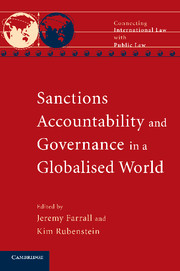Book contents
- Frontmatter
- Contents
- Contributors
- Series editors' preface
- Editors' preface
- Introduction: Filling or falling between the cracks? Law's potential
- PART I Setting down the foundations
- PART II Internationalising public law
- PART III Implementing Security Council sanctions
- PART IV The place of corporations
- 9 The nexus between human rights and business: Defining the sphere of corporate responsibility
- 10 At the intersection of international and municipal law: The case of Commissioner Cole and the Wheat Export Authority
- PART V The role of lawyers
- PART VI Public law and public policy
- PART VII Parallel case studies
- Concluding remarks
- Bibliography
- Index
10 - At the intersection of international and municipal law: The case of Commissioner Cole and the Wheat Export Authority
Published online by Cambridge University Press: 05 October 2010
- Frontmatter
- Contents
- Contributors
- Series editors' preface
- Editors' preface
- Introduction: Filling or falling between the cracks? Law's potential
- PART I Setting down the foundations
- PART II Internationalising public law
- PART III Implementing Security Council sanctions
- PART IV The place of corporations
- 9 The nexus between human rights and business: Defining the sphere of corporate responsibility
- 10 At the intersection of international and municipal law: The case of Commissioner Cole and the Wheat Export Authority
- PART V The role of lawyers
- PART VI Public law and public policy
- PART VII Parallel case studies
- Concluding remarks
- Bibliography
- Index
Summary
[T]he corpus of international law … has been transformed; being no longer exclusively concerned with relationships between nations, it now penetrates formerly sacrosanct national borders and concerns itself with domestic affairs … For Australia this dual transformation, of our federation and international law, now brings international law into intimate relationship with the structure and working of our federation.
Introduction
The global economy is becoming increasingly integrated thanks to developments in technology, the reduction of trade barriers and the increase in direct foreign investment, particularly in developing states. Law, in the broadest sense of that term, has not integrated in the same way. This is, in our view, demonstrated starkly by the Oil-for-Food scandal. The transference of obligations from international to domestic legal systems has been settled for a long time. Ascertaining at what level responsibility attaches for monitoring compliance, investigating cases of apparent non-compliance and, where necessary, imposing sanctions remains unsettled, as this case study demonstrates.
Between 1999 and 2003, a private Australian company, AWB Limited (AWB Ltd), through its subsidiary AWB International Limited (AWB(I)), engaged in dealings with the Iraqi government, which undermined a United Nations sanctions regime that the Australian government was legally obligated to implement. The subsequent inquiry into the sanctions evasion was headed by an eminent Australian lawyer who, in his recommendations, drew attention to the failure of a small regulatory body to prevent the company's misbehaviour.
- Type
- Chapter
- Information
- Sanctions, Accountability and Governance in a Globalised World , pp. 239 - 260Publisher: Cambridge University PressPrint publication year: 2009

